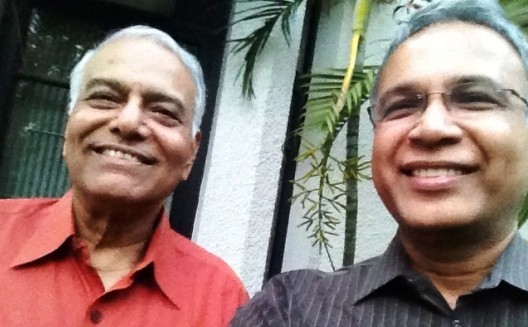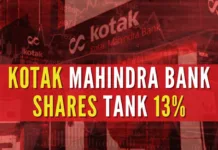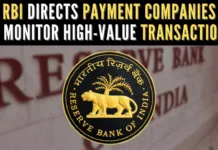
Navin Upadhyay and Sree Iyer
India desperately needs to cut down bank lending rate by as much as 1.5% to revive its economy, says Former Finance minister Yashwant Sinha, adding “a mere nibbling at the rate will not help the situation.”
In an exclusive interview to PerformanceGurus in Delhi on May 15, Sinha also made a veiled criticism of Reserve bank of India (RBI) Governor Raghuram Rajan and said he was ignoring majority opinion within the bank to cut down the Repo rate.
Pointing out that industrial production was not picking up, Sinha made a strong pitch for taking a haircut at the rate, saying mere trimming will not do. Asserting that the most important challenge before the Indian economy was to revive the investment cycle, and for that bringing the Repo rate down was mandatory.
Quoting from the Economic Survey of 2015, Sinha pointed out that large infrastructure projects worth Rs 900,000 crores ($141 billion) were locked up due to a variety of factors. “ Without unlocking them, you could not hope to revive the investment cycle and perk up demand,” he said , “Our failure to ignite the investment cycle is also the reason behind rise of banks’ Non Performing Assets (NPAs) and sluggish demand for industrial goods,” he said.
Sinha pointed to Reliance Power’s decision to withdraw from an ultra power project from Jharkhand and said that corporates will be forced to take up similar decisions if projects held up in other sectors are not expedited. “The locked up projects must be revived at the earliest and demand created for investment goods,” he added.
Sinha said he had heard that the RBI governor was turning a deaf ear to the majority opinion within the bank to cut down the Repo rate. “I heard that four of the seven members of RBI board want a major rate cut, but the governor is ignoring their views,” he said.
A former bureaucrat who has presented seven budgets as Finance minister, Sinha said the only way India could avoid/ stave a crisis is by unlocking these projects and increasing the production of industrial goods such as power, petroleum, steel, cement etc. “These could be achieved only be cutting down the interest rate,” he said.
Sinha is confident that the revival of the investment cycle will perk up both consumption demand and growth. “As things stand, the the banks have stressed assets and corporate balance sheets are in poor shape. So the banks are not willing to lend and the corporates are not ready to borrow,” he said.
“It’s not a question of availability of funds but affordability of funds. Funds will become available if interest rate starts going down. This is one side of the picture. The other side of the picture is that WPI inflation is in negative territory, food inflation and CPI inflation are also below six per cent. Of course, there are challenges like monsoon, global economy and commodities price, but all these challenges will always be there. We can sit down and say six months later something dangerous can happen so I’ll not take rate cut decision. Well, when such a situation occurs, we always have the right to take recourse to remedial measures. But we can’t wait and watch for that. That’s where I differ with the RBI stance”.
“A mere pruning of interest rate will not help. In the past, the RBI twice cut the rate by 25 basis points, which even all the Public Sector Undertaking (PSU) banks e. g. State Bank of India, did not pass down to the customer for a fairly long time. That’s why I suggest a hefty reduction of 1.5%. It’ll not only have a direct impact on sentiment, but banks will be forced to pass it on. It also helps in planning corporate debt restructuring”.
– Yashwant Sinha
The former Finance minister expanded that at present there was a great deal of criticism that most of the corporate debt is turning into bad debt. “When I was Finance Minister in the Vajpayee government, we started a genuine corporate debt restructuring plan. The essential idea was that old high cost debt will be retired and the corporates will borrow at a lower interest rate, which will add to the viability of their enterprises. The corporate took advantage of it in a big way, and even agriculturists and others benefited from it. I extended it even to the state government. The corporate debt structuring then became a genuine programme and not a mere formality. I’m still convinced that if we follow this route and RBI is persuaded to go for a hefty rate cut, the economy could be brought back on track” .
“There will be immediate impact on investment sentiment and it will revive the investment cycle. One must be cautious, but one should not be cautious to a fault. I have great respect for the autonomy of RBI, but unfortunately the RBI is cautious to a fault.”
“They should not be obsessed about checking food inflation alone. Food inflation can only be tackled by supply side measures like more imports, growth in agriculture and a better supply and distribution network. Food inflation can’t be tackled by monetary policy but by fiscal policy. So it should be left to the Government to take effective steps to keep prices in check. But what the RBI has done has hurt the fundamentals of the economy.”
– Yashwant Sinha
Sinha said that the RBI instance of hiking interest rate over a prolonged period to contain inflation has adversely impacted the corporate sector and industrial production. “Now that Wholesale Product Index (WPI) inflation is in negative territory, the RBI should not wait any longer to cut down interest rates” he said.
On the RBI’s contention that there must be enough gap between the Repo rate and deposit rate to incentivize deposits, Sinha said by keeping interest rate high the depositors makes only a notional gain because overall cost of living is also going up.
“You may keep the interest rate low, and food inflation may also remain checked, but still overall cost of living could go up. We are staring at a similar situation,” he said.
- The rise of Patanjali:An Indian yogi’s challenge to MNC giants - January 26, 2016
- Padmas – a blend of excellence, politics and ideology - January 25, 2016
- Scared of hispopularity, British wanted to hang Netaji - January 24, 2016










